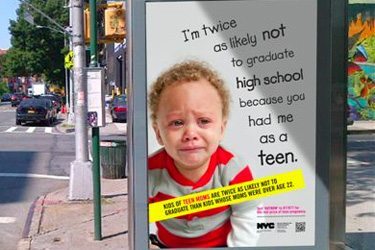Shame From All Angles: Why Doesn’t Anyone Seem to Respect Teen Parents?
A Nebraska judge recently ruled that a pregnant teen in foster care could not have the abortion she was seeking. Many people have pointed out the irony of her being too young to make decisions, but old enough to parent—but the issues at stake here go much deeper.

This piece is published in collaboration with Echoing Ida, a Strong Families project.
In a decision based more on opinion than fact, a Nebraska Supreme Court judge ruled that a 16-year-old pregnant teen in foster care could not have the abortion she was seeking, even though she had the law on her side. The judge ruled that despite demonstrating a tremendous amount of maturity in navigating the judicial process on her own, the young woman was “too immature” to make the decision of whether or not to have an abortion.
While many articles about the case have pointed to the irony of being too young to make decisions, but old enough to parent, the issues at stake in this case go much deeper. In our culture and in our politics, generalizations about teenage sexuality, pregnancy, and parenting are too often used to reinforce a negative narrative and to score points.
There are obvious examples of teenage pregnancy as political fodder from anti-choice politicians. For instance, after Wendy Davis’ 13-hour filibuster against Texas’ omnibus anti-abortion law, it became known in the national press that Davis was a teenage mother. Gov. Rick Perry said it was “unfortunate that [Davis] hasn’t learned from her own example that every life must be given a chance to realize its full potential and that every life matters.” Perry’s cheap shot at Davis’ personal life ignored the fact that a woman has the legal right to choose to be a mother and the human right to bodily autonomy, free from government interference, when making sexual health decisions. Further, choosing motherhood once does not negate the possibility of choosing an abortion at a later time, as most women who seek abortions are already mothers.
Anti-choice attempts to score ideological points with teen motherhood don’t stop with Gov. Perry. No target is off-limits, it seems, as anti-choice advocates have recently appropriated the stories of President Obama and Justin Bieber—both of whose mothers were teenage moms—to show, supposedly, that every “life” has potential. For the anti-choice crowd, teen pregnancy is a good thing so long as it doesn’t result in abortion, and until the moment a pregnancy results in a family that needs support to thrive.
While right-wing anti-choicers hog the spotlight when it comes to judging personal decisions, people of all political and ideological persuasions perpetuate the idea that teenage pregnancy is inherently terrible, and confuse supporting teen parents with encouraging teen pregnancy.
Even among those of us who agree people should be able to make their own sexual and reproductive decisions, we’re often on different sides when it comes to how we can best support teens’ bodily autonomy. While some advocates use tactics meant to scare teens out of having sex, others focus on health education, and a few go further to ensure support for those who are pregnant and parenting.
When a Ms. Blog writer wrote a post about the #NoTeenShame campaign, many of the commenters—ostensibly liberals, feminists, and/or progressives—were quick to sound off about teen parenthood as a terrible decision, and to argue that scaring teens about pregnancy is a good thing. For these commenters and others who think like them, it seems sexual freedom is great as long as you’re not a teen who becomes pregnant and chooses to parent.
The reality is that many curricula, discussions, and public service campaigns that seek to deter teenage sexuality and prevent teen pregnancy are rooted in shaming teenagers and depicting teen pregnancy and parenting as the worst possible outcome for a young person. More times than not, the overarching message of these efforts is that teen sexuality is bad because it leads to teen pregnancy, which leads to a dismal, unsuccessful life for you and your potential future child(ren).
By highlighting perceived “negative” narratives about teen parenthood, like the New York City Human Resources Department recently did, the people behind attention-grabbing anti-teen pregnancy campaigns and messages perpetuate a cultural narrative that shames young people for their sexuality, ensuring that policies and attitudes toward young people are slow to evolve.
More big-dollar anti-teen pregnancy campaigns will perpetuate “lost cause” stereotypes in the future. Meanwhile, many smaller nonprofits—working to combat teen pregnancy by providing information and helping parenting teens defy the statistics—have little access to money because they don’t have “real” teen pregnancy prevention campaigns (in other words, one that scare teens from having sex).
More than the challenges they face in their personal lives, it is the appropriation of teen pregnancy and parenting that cause devastating consequences for teenage families. By silencing their voices with fear, shame, and disenfranchisement, people on both sides of the choice debate erase their experiences, use them to advance their causes, or ignore their stories.
Supporting the status quo may be easy, but it’s not working.
Instead of society saying, “Didn’t you see the ads? Why didn’t you listen? It’s all your fault,” we should be wondering why decades of scare campaigns haven’t worked and start providing support rather than shame.
